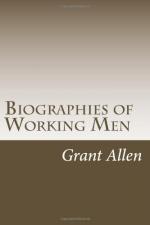England and Hanover were, of course, very closely connected together at the middle of the last century. The king moved about a great deal from one country to the other; and in 1755 the regiment of Hanoverian Guards was ordered on service to England for a year. William Herschel, then seventeen years of age, and already a member of the band, went together with his father; and it was in this modest capacity that he first made acquaintance with the land where he was afterwards to attain the dignity of knighthood and the post of the king’s astronomer. He played the oboe, like his father before him, and no doubt underwent the usual severe military discipline of that age of stiff stocks and stern punishments. His pay was very scanty, and out of it he only saved enough to carry home one memento of his English experiences. That memento was in itself a sufficient mark of the stuff from which young Herschel was compounded. It was a copy of “Locke on the Human Understanding.” Now, Locke’s famous work, oftener named than read, is a very tough and serious bit of philosophical exposition; and a boy of seventeen who buys such a book out of his meagre earnings as a military bandsman is pretty sure not to end his life within the four dismal bare walls of the barrack. It is indeed a curious picture to imagine young William Herschel, among a group of rough and boisterous German soldiers, discussing high mathematical problems with his father, or sitting down quietly in a corner to read “Locke on the Human Understanding.”
In 1757, during the Seven Years’ War, Herschel was sent with his regiment to serve in the campaign of Rossbach against the French. He was not physically strong, and the hardships of active service told terribly upon the still growing lad. His parents were alarmed at his appearance when he returned, and were very anxious to “remove” him from the service. That, however, was by no means an easy matter for them to accomplish. They had no money to buy his discharge, and so, not to call the transaction by any other than its true name, William Herschel was forced to run away from the army. We must not judge too harshly of this desertion, for the times were hard, and the lives of men in Herschel’s position were valued at very little by the constituted authorities. Long after, it is said, when Herschel had distinguished himself by the discovery of the planet Uranus, a pardon for this high military offence was duly handed to him by the king in person on the occasion of his first presentation. George III. was not a particularly wise or brilliant man; but even he had sense enough to perceive that William Herschel could serve the country far better by mapping out the stars of heaven than by playing the oboe to the royal regiment of Hanoverian Guards.




